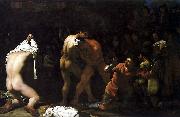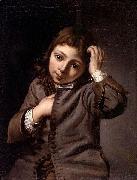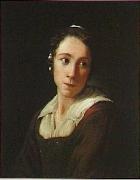Michiel Sweerts Oil Painting ReproductionAll Michiel Sweerts Oil Paintings(29 September 1618-1664), also known as Michael Sweerts, was a Flemish painter of the Baroque period, active in Rome (1645-1656) in the style of the Bamboccianti. The Bamboccianti were known for depicting genre scenes of daily life, but Sweerts's contributions to this genre display greater stylistic mastery and social-philosophical sensitivity than many of his colleagues in this "school." Highly successful in Rome during his years there, Sweerts's reputation suffered a severe collapse not long after his death, lasting centuries; but thanks especially to the 2002 international monographic exhibition devoted entirely to him, Michael Sweerts: 1618-1664, he has begun once again to enjoy the esteem his work clearly merits. Born in Brussels, he arrived in Rome in 1646, and rapidly moved into the circle of Flemish painters associated with Pieter van Laer (leader of the so-called Bamboccianti painters) and that resided near Santa Maria del Popolo. In 1647, he attended meetings of the Accademia di San Luca, although not as a member. Despite the fragmentary nature of evidence pertaining to his career in Rome and the post-mortem eclipse of his reputation, we know that Sweerts succeeded in creating for himself a sufficiently exalted reputation in the city so as to enter into the service of the ruling papal family itself, the Pamphilj, more specifically, Camillo Pamphilj, nephew of reigning Pope Innocent X who, at the encouragement of Camillo, bestowed upon Sweerts the papal title of Cavaliere di Cristo, the same honor enjoyed by the likes of Gian Lorenzo Bernini and Francesco Borromini. Despite working in the highest echelons of papal patronage in Rome, sometime between 1652 and 1654, for reasons unknown Sweerts left the Eternal City and returned to the North, and by 1656, he had returned to Brussels, where he joined the painter's guild. He joined the Paris Foreign Missions Society as a lay brother and became a devout Christian. In 1658 he made the guild a self portrait as a farewell gift and moved to Amsterdam, where he would oversee the building of a ship for travel with the aforementioned Missions Étrangeres to Palestine. |
|||

|
|||
|
|
|||
|
||||||||
| Michiel Sweerts (29 September 1618-1664), also known as Michael Sweerts, was a Flemish painter of the Baroque period, active in Rome (1645-1656) in the style of the Bamboccianti. The Bamboccianti were known for depicting genre scenes of daily life, but Sweerts's contributions to this genre display greater stylistic mastery and social-philosophical sensitivity than many of his colleagues in this "school." Highly successful in Rome during his years there, Sweerts's reputation suffered a severe collapse not long after his death, lasting centuries; but thanks especially to the 2002 international monographic exhibition devoted entirely to him, Michael Sweerts: 1618-1664, he has begun once again to enjoy the esteem his work clearly merits. Born in Brussels, he arrived in Rome in 1646, and rapidly moved into the circle of Flemish painters associated with Pieter van Laer (leader of the so-called Bamboccianti painters) and that resided near Santa Maria del Popolo. In 1647, he attended meetings of the Accademia di San Luca, although not as a member. Despite the fragmentary nature of evidence pertaining to his career in Rome and the post-mortem eclipse of his reputation, we know that Sweerts succeeded in creating for himself a sufficiently exalted reputation in the city so as to enter into the service of the ruling papal family itself, the Pamphilj, more specifically, Camillo Pamphilj, nephew of reigning Pope Innocent X who, at the encouragement of Camillo, bestowed upon Sweerts the papal title of Cavaliere di Cristo, the same honor enjoyed by the likes of Gian Lorenzo Bernini and Francesco Borromini. Despite working in the highest echelons of papal patronage in Rome, sometime between 1652 and 1654, for reasons unknown Sweerts left the Eternal City and returned to the North, and by 1656, he had returned to Brussels, where he joined the painter's guild. He joined the Paris Foreign Missions Society as a lay brother and became a devout Christian. In 1658 he made the guild a self portrait as a farewell gift and moved to Amsterdam, where he would oversee the building of a ship for travel with the aforementioned Missions Étrangeres to Palestine. |
||||||||
|
|
||||||||
| Gemälde IDENTIFIZIERUNG:: 85203 Wrestling match Date ca.1648-50 Medium Oil on canvas cjr |
||||||||
|
|
||||||||
| Gemälde IDENTIFIZIERUNG:: 90986 Portrait of a boy 1658(1658) Medium Oil on panel transferred to canvas Dimensions Height: 29 cm (11.4 in). Width: 22 cm (8.7 in). cyf |
||||||||
|
|
||||||||
| Gemälde IDENTIFIZIERUNG:: 92863 Portrait of a young woman. 1661 Medium oil on canvas Dimensions 61 X 53.5 cm (24 X 21.1 in) cjr |
||||||||
|
|
||||||||
|
| VORHERIGER KÜNSTLER NÄCHSTER KÜNSTLER | |||||||
|
|
||||||||
|
Michiel Sweerts (29 September 1618-1664), also known as Michael Sweerts, was a Flemish painter of the Baroque period, active in Rome (1645-1656) in the style of the Bamboccianti. The Bamboccianti were known for depicting genre scenes of daily life, but Sweerts's contributions to this genre display greater stylistic mastery and social-philosophical sensitivity than many of his colleagues in this "school." Highly successful in Rome during his years there, Sweerts's reputation suffered a severe collapse not long after his death, lasting centuries; but thanks especially to the 2002 international monographic exhibition devoted entirely to him, Michael Sweerts: 1618-1664, he has begun once again to enjoy the esteem his work clearly merits. Born in Brussels, he arrived in Rome in 1646, and rapidly moved into the circle of Flemish painters associated with Pieter van Laer (leader of the so-called Bamboccianti painters) and that resided near Santa Maria del Popolo. In 1647, he attended meetings of the Accademia di San Luca, although not as a member. Despite the fragmentary nature of evidence pertaining to his career in Rome and the post-mortem eclipse of his reputation, we know that Sweerts succeeded in creating for himself a sufficiently exalted reputation in the city so as to enter into the service of the ruling papal family itself, the Pamphilj, more specifically, Camillo Pamphilj, nephew of reigning Pope Innocent X who, at the encouragement of Camillo, bestowed upon Sweerts the papal title of Cavaliere di Cristo, the same honor enjoyed by the likes of Gian Lorenzo Bernini and Francesco Borromini. Despite working in the highest echelons of papal patronage in Rome, sometime between 1652 and 1654, for reasons unknown Sweerts left the Eternal City and returned to the North, and by 1656, he had returned to Brussels, where he joined the painter's guild. He joined the Paris Foreign Missions Society as a lay brother and became a devout Christian. In 1658 he made the guild a self portrait as a farewell gift and moved to Amsterdam, where he would oversee the building of a ship for travel with the aforementioned Missions Étrangeres to Palestine. |
||||||||
|
|
||||||||
|
KONTAKTIEREN Sie UNS |








